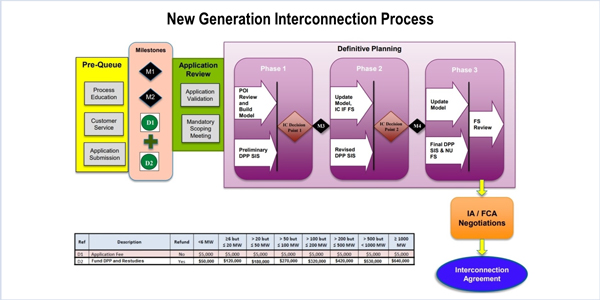By Amanda Durish Cook
FERC last week accepted several small revisions to MISO’s new interconnection queue design but also told the RTO it must keep working to ensure it sticks to a commitment to reduce restudies.
The commission provided MISO a month to revise its Tariff to eliminate a practice of automatically conducting a restudy based on predetermined triggers, which include a project’s termination or the withdrawal of a project from the queue (ER17-156-002).
“In the October 2016 queue reform filing, MISO proposed that, instead of conducting a restudy automatically upon each occurrence of a restudy trigger, the RTO would re-evaluate the need for any common use or shared network upgrades associated with the project,” FERC said.
FERC largely accepted MISO’s new, three-stage interconnection queue in January 2017, but it sought more detail on a few aspects of the plan, prompting a follow-up filing. (See FERC Accepts MISO’s 2nd Try on Queue Reform.) The commission at the time directed MISO to conduct restudies on an as-needed basis only, even when a triggering event occurs. It said the RTO “could decide in its discretion whether a restudy was needed or not.”
In revisions filed last March, MISO altered its Tariff to enable it to conduct restudies for reasons other than triggering events. In the most recent ruling, FERC reversed that move, saying the RTO cannot conduct a restudy absent a trigger.
FERC accepted several other smaller Tariff revisions that it had directed MISO to make, including:
- Stipulating mandatory attendance of transmission owners in scoping-level meetings between MISO staff and interconnection customers;
- Describing the types of events that trigger a queue restudy; and
- Offering customers a provisional generator interconnection agreement option at any time in the interconnection process, regardless of whether MISO failed to meet a study deadline.
MISO was also required to scale back its site control requirement by the queue’s second decision point from 100% to 75% after FERC determined that complete site control is difficult to obtain so early in the process.
The RTO also had to clarify that an interconnection customer that withdraws early in the queue — at either the first or second decision points — will not be responsible for the costs of other customers’ interconnection studies, and that a customer withdrawing at the third decision point should only pay a study deposit fee to cover a potential restudy for another interconnection customer.
Finally, MISO added language to clarify that the batch of projects entering the definitive planning phase in August 2015 was grandfathered into the old queue design.
However, FERC’s recent ruling gave the RTO 30 days to clarify that the queue’s third and fourth $4,000/MW milestone payment collection is only an initial charge subject to change as costs become clearer in the study process.
“This language implies that the M3 and M4 milestone payments are set to $4,000/MW and are not subject to a true-up as more accurate estimates become available, which is not in line with MISO’s indication in its testimony,” FERC said.
In accepting MISO’s filing, FERC dismissed a bundle of complaints from EDF Renewable Energy as being outside the scope of the proceeding. EDF had asked FERC to force MISO to share more network modeling details and prescribe “remedies” should the RTO fail to complete studies on time. The company also sought a directive instructing MISO to develop a fast-track queue option for vetted projects, and complained that the RTO failed to coordinate its generator interconnection process with the transmission planning process.
Another EDF complaint against MISO’s new queue design is still outstanding. (See Renewables Developer Escalates MISO Queue Design Dispute.)






